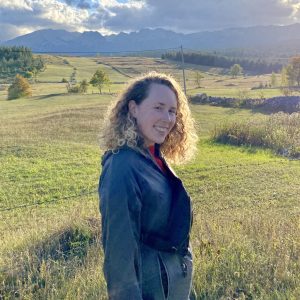The European FoodMAPP project is an initiative that emerges as a possible solution against the adherence of the public to food supply through: (1) large stores and (2) technological platforms.
One of the methodologies used to carry out the project is the staff exchange between the different organizations and institutions participating in FoodMAPP, in order to combine and share cross-sectoral knowledge and support the competitiveness of European industry.
Esther Van Parys is a PhD candidate and researcher in the research group on Agri-Food Marketing and Chain Management at the Department of Agricultural Economics at the University of Ghent. Van Parys collaborates with FoodMAPP assessing the role of digital platforms in local food supply, both through stakeholder and consumer perspectives.
As part of her work on the project, the researcher has spent a month at the Center for Agro-Food Economics and Development (CREDA) and we have been able to talk to her:
 To start from the beginning, what is the role of Ghent University in the FoodMAPP project?
To start from the beginning, what is the role of Ghent University in the FoodMAPP project?
We are the leaders of the first work package (WP1). It focuses on analyzing and understanding the perspectives of stakeholders and consumers in the development of a digital platform for food shopping, mainly focusing on the local context.
What have you been doing during your stay at CREDA?
Since the project started, in the previous months, we did interviews with stakeholders and a workshop with consumers, each partner did the same in their region, so CREDA did it too. Now we have moved on to the next phase, and that is what I came to do in CREDA.
I understand that as all partners carry out a set of interviews and workshops, is what you have done at CREDA quite related to what you do at Ghent University?
Yes, it’s the next step of the research. The workshops and interviews that each partner did were to get to know and explore the perspectives of both sides, but on a lower, more local scale. With the results obtained, especially those of consumers, we are developing a survey by which I came to CREDA, to work with Djamel. Our intention is to conduct a choice experiment and Djamel knows a lot about this subject, so during my stay in CREDA, mainly I have been working with him to talk over possible ideas and look at the design.
How many people do you intend to reach with the new survey?
We want to achieve a big sample, I would say that our goal is to achieve like 500 consumer responses in each country. Thus, we can have broader results that help us to know more details about their perspectives.
And now that you’ve been immersed in FoodMAPP for a few months, what do you think of this type of project?
I think it’s an interesting project. Its ultimate goal is to develop an APP that allows food shopping and supports local economies. If you look at the scientific literature, we are seeing more and more studies on this online food shopping, and it is often related to short supply chains within a local context. That’s why I think it’s very interesting to be able to participate in projects like FoodMAPP, since it brings a little more perspective for the future for the sector, while people are so very hesitant towards using online platforms for food shopping. It is a great opportunity to create a balance between where we are going and where we come from.
Do you think that professional exchange brings something to the workers?
Totally, I think that the fact that it is a small project gives you the opportunity to connect with everyone and that is a very good thing. Coming to CREDA has been nice because I was not the only contributor to FoodMAPP making the stay here, so it has been great to be able to meet partners from Lyon, Hungary and Austria. In addition, I think that joining everyone together is also a great experience for the project itself.
There have been many partners who have opted for CREDA, in your case, why did you choose to stay here?
Because of the similarities. CREDA and our department in Ghent, although different, have several things in common and similarities, so even though our expertise is a little different, we can talk about the same things. This is a good thing, as we can learn from each other and see what we are doing. What made me decide, mainly, was the methodology of the choice experiment, in Ghent we also use it, but here you have more experience with it, so it has been great to be able to exchange knowledge and learn about it.

